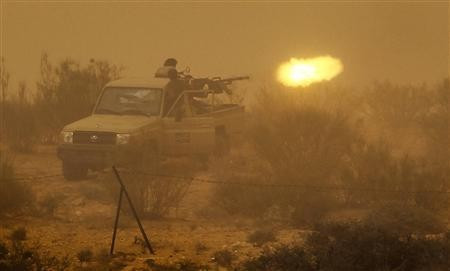France Announces Withdrawal of Carrier: Is the Libya NATO Operation Too Costly?

France announced on Thursday that its aircraft carrier Charles de Gaulle would return on French territory for maintenance next week after being used for the NATO-led mission.
The vessel which is France's only aircraft carrier and Europe's biggest warship, will leave on August 10 and head to Toulon for several weeks of work, defence minister Gerard Longuet told Var-Matin newspaper.
Longuet defended France's latest move and insisted that Paris is still very much committed to the NATO-led operation in Libya.
France, with the UK, has been at the forefront of the operation which has led to air strikes being conducted against Gadhafi's forces and buildings.
The operation was however widely criticised after accusations of civilians being targeted emerged, while many reproach the recurrent strikes on Tripoli, saying the city and Libya's capital is now slowly being destroyed.
"Gadhafi should not expect any respite," he said, warning that French warplanes would keep up their strikes and reconnaissance flights from land bases.
The French navy website however contradicted Longuet's comments by saying on Thursday it would take "several months" to complete the work on the ship instead of the "several weeks" previously indicated by the minister.
Longuet's announcement came three days after Norway withdrew its final four F-16 fighter jets, while Italy scaled back its involvement in the operation after withdrawing the aircraft carrier Garibaldi, prompting analysts to question the viability of the operation.
To try and make up for the Norwegian's withdrawal and insisting the mission is still very much on, the UK announced it would deploy four Tornado jets.
In addition to the latest withdrawal, the Libyan opposition was rocked to its core last week, following the death of Abdul Fateh Younis, the general of Libyan rebels and Chief of staff of the National Transitional Council, (NTC,.
Divisions within the rebel movement became more apparent, as while the NTC blamed the death on "armed gangs", others insisted the men responsible might have come from within the movement. NTC officials were also recorded providing different and conflicting account of the murder and many said the movement is being spilt from the inside, with different small factions fighting for more power.
A week after the murder, the death is still left largely unexplained and, as the affair was said to have "embarrassed" the coalition forces.
When the coalitions and NATO operation started more than five months ago, most leaders assumed the rebels would be able to oust Gadhafi within weeks. However almost six months later and the Libyan leader is still in power, with no clear indication he would be willing to step down. Throughout the months officials from both France and the UK have warned that the operation was costly and could not be upheld for months on end.
Prior to the death of Younis, NATO members also insisted progress in negotiations were being made and hints of Gadhafi being willing to negotiate his exit became more and more insistent, so the withdrawals from France, Italy and Norway seem questionable. Could cost of the Libyan operation be weighting too much on the coalition forces?
© Copyright IBTimes 2025. All rights reserved.





















